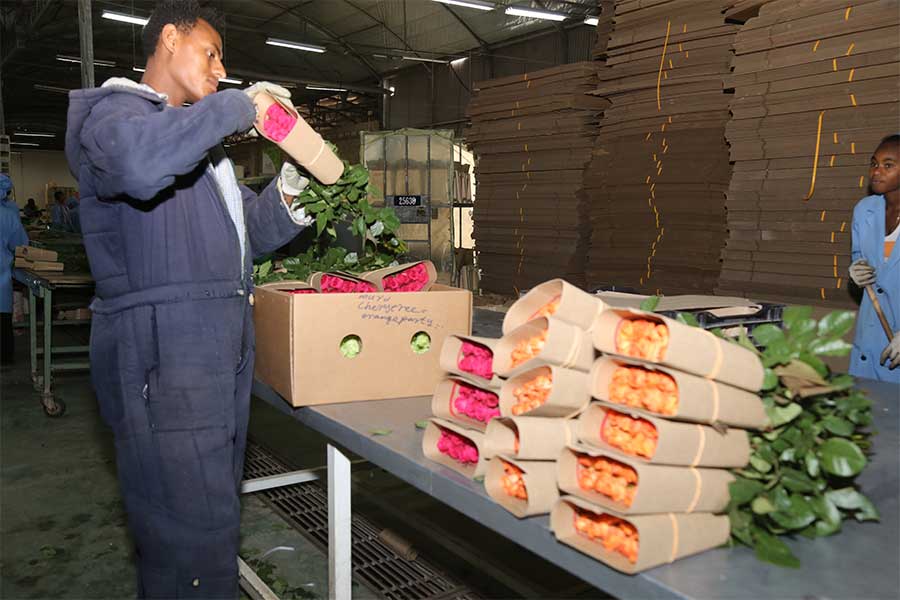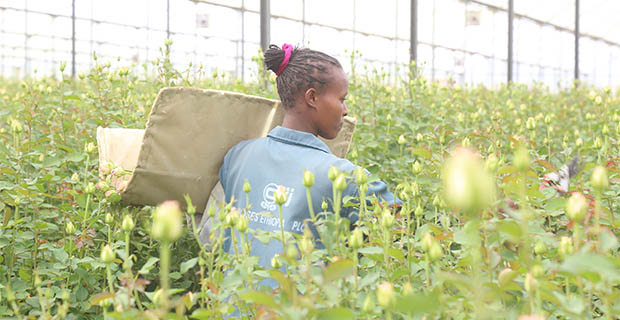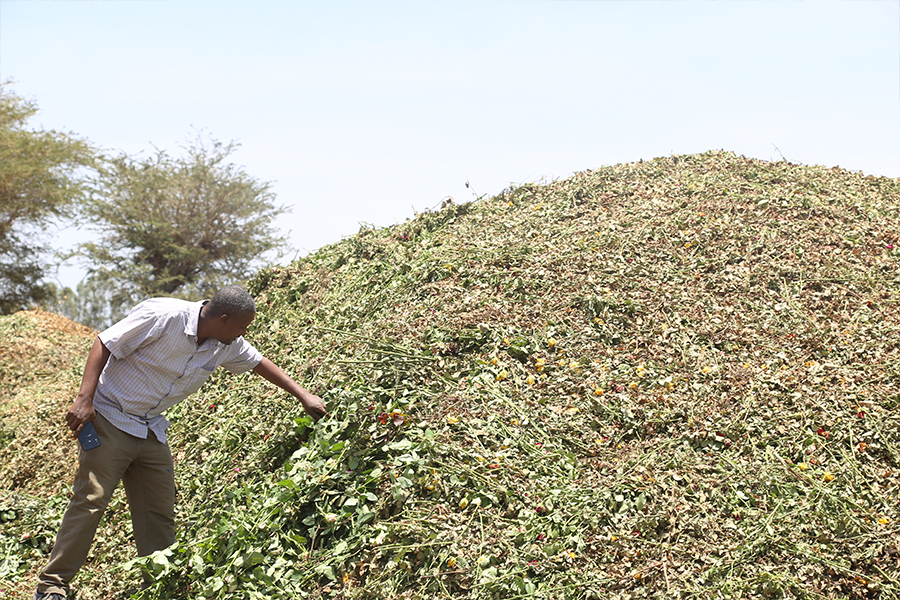
Fortune News | Jun 14,2020
Apr 1 , 2020
 A total of 150,000 employees are also on the edge of losing their jobs.
A total of 150,000 employees are also on the edge of losing their jobs. Ethiopia’s flower industry, the second-largest exporter to Europe, is at the brink of disaster with close to 11 million dollars in losses incurred over the past two weeks. A total of 150,000 employees are also on the edge of losing their jobs.
The country is currently exporting less than 20pc of the 160tn of flowers that are normally shipped daily to Belgium, France, Germany, and the Middle East among other destinations. The volume has dropped following the outbreak of Coronavirus (COVID-19).
After Europe was hit by the Coronavirus, the demand for flowers has plummeted, according to Zelalem Mesele, president of the Ethiopian Horticulture Producer Exporters Association.
"Most of the destinations have also closed their passageways," said Zelalem, "and the exporters are left with no choice but to destroy the flowers."
The country is currently exporting less than 20pc of the 160tn of flowers that are normally shipped daily to Belgium, France, Germany, and the Middle East among other destinations. The volume has dropped following the outbreak of Coronavirus (COVID-19).
Tana Flora Plc., which was established in 2008 and farms over 124ha at Wengita, Bahir Dar, and Addis Abeba with over 700 employees, is one of the farms that has completely stopped exports.
The company mainly ships avocados as 34.6pc of its exports and 19 different varieties of roses as the remaining 64.4pc. Its main destinations are the Middle East and Europe. Those destinations have closed their doors. In January and February, the grower and exporter had a turnover of 1.5 million euros.
"We're sitting with 1.8 million stems to be disposed of and have lost over 10 million Br in the past nine days," Nega Mekunanit, general manager of Tana Flora, told Fortune.
Following the alarming state of the industry, the Association sent a letter to the Office of the Prime Minister last week seeking the government's intervention. In the letter, the Association showed that the impact could lead to the layoff of 150,000 employees if the conditions do not improve.
From a total of 723 million dollars, the export sector generated during the first half of this fiscal year, flower exports contributed 225 million dollars. Over 72 flower and fruits and vegetable exporters operate in the country with total coverage of 10,897ha of land. In the last fiscal year, the flower export generated 300 million dollars.
As a means to survive through the current critical situation, the Association pleaded for a working capital injection from banks, suspension of loan repayment as well as interest rates, and to reclaim the Value Added Tax (VAT) that was paid in the assumption that it will be recollected.
“We have received a positive response from the government," said Zelalem.
During a pandemic like this, banks and horticulture are going to be the first to get hit hard, according to Eyob Tesfaye (PhD), a macroeconomist.
“If things continue like this, exports will go downhill," he said. "In parallel, imports will also plummet and will raise the inflation bar."
The exporters did right in forwarding their request to the Prime Minister, and sectors should help one another to mitigate the issue, according to the expert.
"Small exporters are going to be crushed if the situation continues like this, and it’s tough to resurrect the small exporters back to their feet,” he added.
It is very hard to say there will not be any sector that will not be impacted by this pandemic; it will have a domino effect on industries. Due to the lack of exports and imports, foreign currency and remittances, banks will have a nightmare with the current liquidity problem, according to the expert.
"It’s a big hiccup for the government, in the worst-case scenario the government will have to reallocate the budget or there will be a big budget deficit,” Eyob said.
PUBLISHED ON
Apr 01,2020 [ VOL
20 , NO
1040]

Fortune News | Jun 14,2020

Radar | Apr 21,2024

Radar | Oct 30,2021

View From Arada | Apr 13,2019

Fortune News | Oct 20,2024

Radar | Nov 23,2019

Radar | Apr 29,2023

Agenda | Mar 28,2020

Commentaries | Oct 28,2023

Radar | Oct 30,2021

Dec 22 , 2024 . By TIZITA SHEWAFERAW
Charged with transforming colossal state-owned enterprises into modern and competitiv...

Aug 18 , 2024 . By AKSAH ITALO
Although predictable Yonas Zerihun's job in the ride-hailing service is not immune to...

Jul 28 , 2024 . By TIZITA SHEWAFERAW
Unhabitual, perhaps too many, Samuel Gebreyohannes, 38, used to occasionally enjoy a couple of beers at breakfast. However, he recently swit...

Jul 13 , 2024 . By AKSAH ITALO
Investors who rely on tractors, trucks, and field vehicles for commuting, transporting commodities, and f...

Oct 18 , 2025
The political establishment, notably the ruling party and its top brass, has become p...

Oct 11 , 2025
Ladislas Farago, a roving Associated Press (AP) correspondent, arrived in Ethiopia in...

Oct 4 , 2025
Eyob Tekalegn (PhD) had been in the Governor's chair for only weeks when, on Septembe...

Sep 27 , 2025
Four years into an experiment with “shock therapy” in education, the national moo...